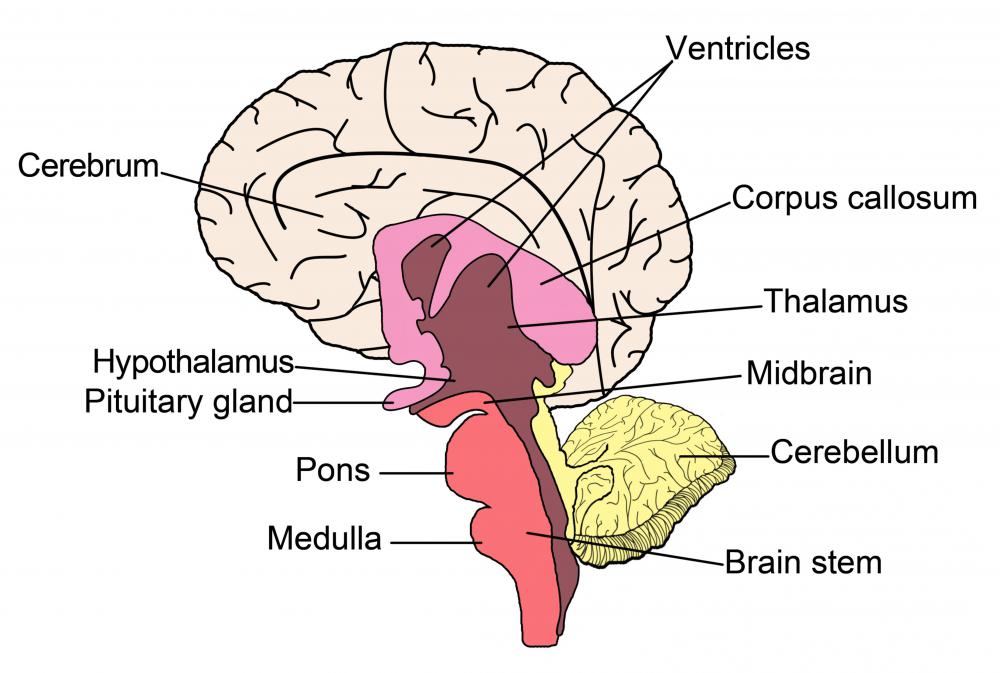At WiseGEEK, we're committed to delivering accurate, trustworthy information. Our expert-authored content is rigorously fact-checked and sourced from credible authorities. Discover how we uphold the highest standards in providing you with reliable knowledge.
What is Alpers' Disease?
Alpers' disease is a very rare disorder that is characterized by progressive damage and loss, or degeneration, of cells in the brain and severe problems with the liver, eventually leading to death. It's also known as progressive sclerosing poliodystrophy, and progressive neuronal degeneration of childhood. It is a hereditary disease affecting children with onset of symptoms before age five. Symptoms include seizures, loss of muscular control, dementia, and liver failure. There is no cure for Alpers' disease; treatment focuses on easing the symptoms.
It's estimated that Alpers' disease afflicts less than 1 in 200,000 children; it's hard to get an accurate number, however, due to difficulties diagnosing the disorder. It is carried on one of the genes as a recessive trait, so both parents have to be carriers to pass it on to their child. The exact mechanism of the disorder is unknown, but it's thought to be a metabolic defect that affects the functioning of mitochondria in the cells leaving them unable to produce energy for the tissues. Without this needed energy, the cells of the grey matter in the cerebrum are damaged and die, causing problems throughout the body.

Children afflicted with Alpers' disease typically show the first symptoms between the ages of three months and five years. Usually the first signs of a problem are seizures, stiffness of the limbs, and abnormal muscle tone called hypotonicity. These indicators are often followed by failure to reach cognitive and developmental milestones and loss of skills and abilities that were already present.

Alpers' disease is a progressive disorder, meaning it continuously increases in severity. From the beginning signs children continue to lose functioning, eventually becoming unable to control their muscles, communicate, or process information. They frequently develop dementia and lose all cognitive function. They can develop blindness from a condition called optic atrophy which is the degeneration of the optic nerve until it is no longer functional. Usually liver disease develops and the patients experience jaundice and eventual liver failure.

The deterioration usually progresses quickly, leading to eventual death when the body and brain are no longer able to function. From the onset of symptoms, patients can die within a year. Death is often caused by the uncontrollable seizures, liver failure, or cardio-respiratory failure. Patients with Alpers' disease rarely survive past ten years old.

Because of the fatal nature of Alpers' disease, treatment focuses on maintaining functioning and comfort as long as possible. At present, there is no way to slow the progress of the disease, but measures can be taken to keep patients as comfortable as possible. Treatments can include physical therapy and anti-convulsant medications.
AS FEATURED ON:
AS FEATURED ON:














Discussion Comments
@ddljohn-- Yes, it is very hard to diagnose. My friend said that a muscle biopsy was how they diagnosed her daughter. Neurologists diagnose the disease but it does require a lot of testing, requiring an EEG, or a biopsy.
I've read on a forum that many children who die of this disease are actually diagnosed after their death because it can become fatal very quickly after symptoms start.
It's really sad and only people who have gone through this can know the frustration and pain of trying to get a diagnosis.
@anamur-- Do you know how the disease was diagnosed?
I mean, there is no specific test that can diagnose Alpers' disease right? And since it's so rare, most doctors will not have seen an Alpers' disease patient in their lives probably. Seizures also happen with many diseases and disorders. So that definitely can't be enough to diagnose it.
I think parents of children with this disease must have a really hard time with the diagnosis process. And doctors too of course.
A close friend's daughter has recently been diagnosed with Aplers' disease. The entire family and all of us are just devastated. My friend said that she might live anywhere between several months to several years.
The little girl is a year and a half now and has seizures several times a week. She also has muscular disease symptoms. Her parents were dumbfounded about what they were dealing with. But after so many tests, the neurologists finally confirmed that its Alpers' disease.
It's so disheartening because there is no cure. They're probably going to keep the little girl in a facility after this because it's too hard to keep her at home and rush to the hospital every time there is a seizure. They want her to have access to medical care all the time.
Post your comments